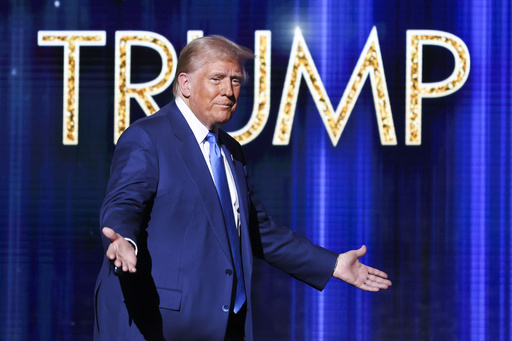CHICAGO — As Donald Trump’s Cabinet starts to come together, individuals on both sides of the abortion issue are closely observing how his selections may influence reproductive rights during his second term in office.
Trump’s appointments provide an early indication of how his administration may approach abortion policy. This comes in light of his previous mixed messages regarding the topic while on the campaign trail. He attempted to separate himself from anti-abortion supporters by suggesting that the power to legislate abortion should rest with the states, despite taking pride in nominating three Supreme Court justices who played a significant role in overturning decades of constitutional protections for abortion rights.
In a recent NBC News interview, Trump stated that he does not intend to impose restrictions on medication abortion. However, he also acknowledged that “things change,” which kept the speculation alive regarding his standpoint on the issue.
So far, the initial roster of his new administration, including key nominations for health agencies, the Justice Department, and the Department of Veterans Affairs, has received mixed feedback but is generally viewed positively by anti-abortion groups.
Experts in abortion law noted that Trump’s choice to nominate individuals without strong connections to the anti-abortion movement might signal that he does not prioritize the issue. Greer Donley, an associate law professor, remarked that this choice suggests Trump may be redirecting his administration’s focus elsewhere.
Karen Stone from the Planned Parenthood Action Fund highlighted that while many nominees have notable records opposing reproductive health care, others do not have such clear stances. She warned against jumping to conclusions based solely on initial cabinet appointments.
Despite this, numerous abortion rights advocates remain cautious since several nominees express strong anti-abortion beliefs, even if they lack direct affiliations with anti-abortion organizations. Their concern lies in a potential administration populated by officials personally opposed to abortion, who may act to limit access to the procedure and its funding.
Mary Ruth Ziegler, a law professor at UC Davis, stated that Trump’s unpredictable approach during his campaign leaves many questions regarding future policies. The direction of these policies may become clearer as personnel in essential departments are appointed.
Trump has suggested he would nominate Robert F. Kennedy Jr. — an anti-vaccine activist — to head the Health and Human Services Department, which has been a focus for anti-abortion advocates aiming to restrict abortion rights nationwide. Kennedy’s views on abortion have also changed throughout his presidential campaign. He has supported access to abortion until a certain viability point but has described each abortion as a tragedy and previously backed a nationwide ban after 15 weeks, a position he later backtracked on.
The leader of Health and Human Services oversees Title X funding for family planning services and has significant influence over agencies connected to abortion access, including the FDA and Medicaid services. This role is particularly crucial given ongoing legal disputes surrounding the federal law EMTALA and the FDA’s approval of the abortion pill mifepristone.
Mini Timmaraju, president of Reproductive Freedom for All, criticized Kennedy, expressing he is unsuitable and not equipped to safeguard the reproductive rights and health of American families.
The nomination has stirred mixed reactions among anti-abortion factions, with former Vice President Mike Pence urging the Senate to reject Kennedy. Marjorie Dannenfelser, head of Susan B. Anthony Pro-Life America, voiced her group’s concerns, emphasizing the need for a pro-life leader in the Health and Human Services Department.
Trump’s selection of Fox News correspondent Marty Makary to direct the FDA, an agency pivotal for medication abortion and contraception access, has also raised eyebrows, as abortion rights organizations have accused him of spreading misinformation about abortion.
Russell Vought, an outspoken anti-abortion conservative, was nominated for director of the Office of Management and Budget. He was instrumental in creating Project 2025, a conservative strategy aimed at undermining reproductive rights, including proposals to eliminate access to medication abortion nationwide and cut Medicaid funding for abortion services.
Despite previously distancing himself from conservative viewpoints during the campaign, Trump is appointing many individuals involved in shaping Project 2025. He acknowledged during an NBC interview that many aspects of the plan align with his thinking.
A range of reproductive rights organizations has voiced their concerns, stating that these cabinet appointments reinforce fears regarding Project 2025’s influence.
Dr. Mehmet Oz, another controversial appointment, is expected to head the Centers for Medicare and Medicaid Services. His inconsistent views on abortion were evident during his unsuccessful Senate bid, where he identified as strongly pro-life yet aligned with Trump’s argument for allowing states to control abortion decisions.
Pam Bondi, the Florida attorney general, known for defending strict abortion restrictions, has been chosen by Trump for the attorney general position. While her nomination is welcomed by anti-abortion advocates, it raises alarm among abortion rights supporters that she may attempt to revive an archaic law barring the mailing of abortion-related items.
Additionally, David Weldon, a former Florida congressman known for his anti-abortion stances, is set to lead the Centers for Disease Control and Prevention, an agency responsible for tracking abortion rates. Doug Collins, another former congressman who has consistently voted against abortion funding, has been appointed to oversee the Department of Veterans Affairs amid ongoing debates regarding abortion access and funding for veterans.
Kristin Hawkins, president of Students for Life, stated, “This is a team that the pro-life movement can work with,” reflecting the optimism within the anti-abortion sector about these appointments.
